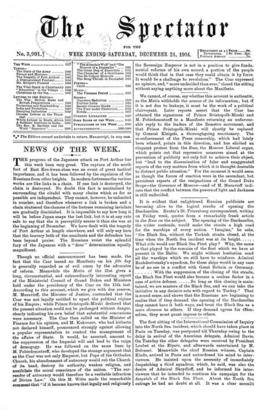Though no official announcement has been made, the fact that
the Czar issued no Manifesto on his fete day is generally regarded as of evil omen by the advocates of reform. Meanwhile the Maim of the 21st gives a long, circumstantial, and extraordinarily interesting report of the Ministerial Council of Grand Dukes and Ministers held under the presidency of the Czar on the 15th inst. According to this account, which we give with due reserve, M. Muravieff, the Minister of Justice, contended that the Czar was not legally entitled to upset the political regime of his Empire ; while Prince Sviatopolk-Mirski declared that the present situation could not be prolonged without danger, clearly indicating his own belief that substantial concessions were necessary. The Czar then called on the Minister of Finance for his opinion, and M. Kokovzov, who had hitherto not declared himself, pronounced strongly against allowing a popular representation to control the management of the affairs of State. It would, he asserted, amount to the suppression of the Imperial will and lead to the reign of demagogy. He was followed on the same lines by M. Pobiedonostzeff, who developed the strange argument that as the Czar was not only Emperor, but Pope of the Orthodox Church, his abandonment of autocracy would rob the Church of its head, destroy its authority, weaken religion, and annihilate the moral conscience of the nation. " The sur- render of autocracy would therefore be a veritable infraction of Divine Law." On this M. Witte made the remarkable comment that " if it became known that legally and religiously


































